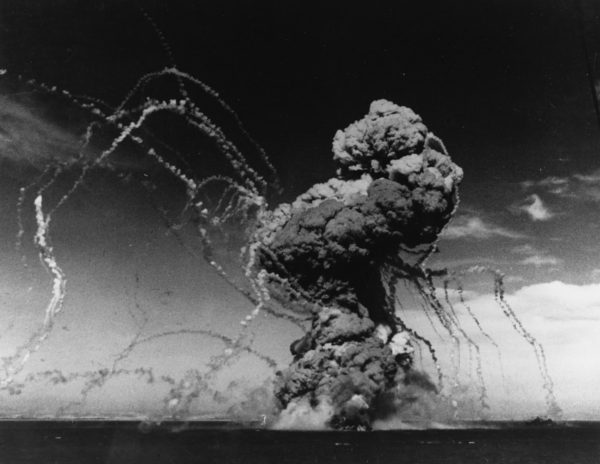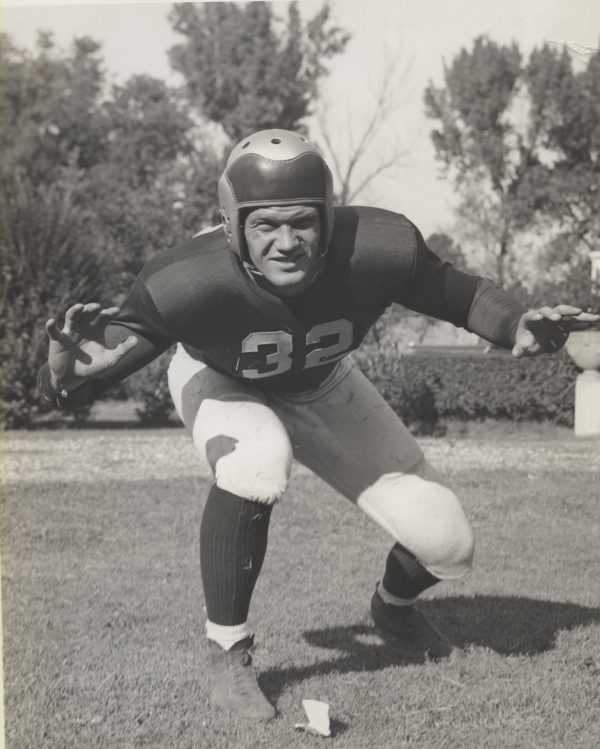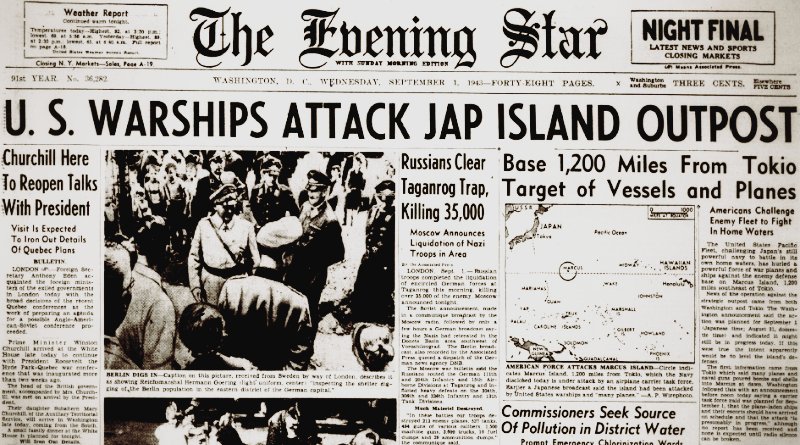World War II Chronicle: September 1, 1943
Click here for TODAY’S NEWSPAPER
Front page: Rear Admiral Charles A. Pownall’s task group of aircraft carriers Yorktown, Essex, and Independence gave Marcus Island a good working over. Marcus is over 1,500 miles west of Midway and is just under 1,000 miles from Tokyo. Meanwhile, Germany reports that August was the least successful month their U-boat fleet sunk has had in nine months. The Kriegsmarine lost 25 subs in August and in the past two months the Allies sank five of the Type XIV subs — the “milk cows” that carried fuel, oil, torpedoes, and food to replenish the U-boats at sea. Only three milk cows remain…
Page three features pictures of an American cargo ship exploding after the Sicily landing operation. This is the Liberty Ship SS Robert Rowan, which carried soldiers and ammunition to support the Battle of Sicily. On July 11 German Ju-88 Stuka bombers hit the ship with three 1,000-lb. bombs. The ship was abandoned, and all aboard were saved…

Gen. Hap Arnold says that his Air Force will soon have new heavy bombers that dwarf the B-17, see page six… United Aircraft News ad on page seven, which shows where the various numbered Army Air Forces are operating, plus a picture of a Sikorsky helicopter landing on a Naval vessel… George Fielding Eliot column on page 10…
Sports begin on page 16, which discusses Bronko Nagurski coming out of retirement to play for the Bears again… Golfing legend Bobby Jones is now a major in the Army Air Force, and has been assigned a new post in Washington, D.C. Stay tuned for more…
Today we highlight the NFL’s All-Decade Team from the 1940s, covering the tackles. Click here for quarterbacks and halfbacks, fullbacks and ends here, while guards and centers are here.
Al Blozis was a superstar at Georgetown and the Chronicle is loaded with Blozis coverage, especially in 1941 during his college days. He is in his second season with the New York Giants… Baby Ray was 6’6″ and 280 lbs. when he played at Vanderbilt — massive for his era. He is now entering his fifth season with the Green Bay Packers… Grantland Rice once said that George Connor — now entering his second season with Holy Cross — was “the closest thing to a Greek God since Apollo.”

The Phil-Pitt Steagles have three All-Decade linemen on their team this year: Future Hall of Fame lineman Artie Donovan, who left Notre Dame after one semester to join the Marine Corps, said that Bucko Kilroy was a “dirty bastard.” Kilroy “took kickoffs literally. He’d run downfield kicking people, just kicking them out of bounds. And he never got called for it.” Kilroy played for Temple University, but has spent the last couple years in the Merchant Marine. Although he was not drafted Kilroy is about to make his pro debut… Vic Sears is a third-year lineman… Al Wistert was one of three Wistert brothers to play tackle for the University of Michigan. All wore the number 11 jersey, all made the college football hall of fame. Al was co-captain of the College All-Star team that just beat the Redskins. During his last season with the Wolverines he was consensus All-American and team most valuable player.
Roving Reporter by Ernie Pyle
(This is the sixth of Ernie Pyle’s series on General Bradley. It was delayed in transmission.)
SOMEWHERE IN SICILY — It isn’t customary for anybody as high as a corps commander to get too close to the actual fighting but Lieut. Gen. Omar Bradley insists on keeping his command post up close, sometimes distressingly close, behind the front lines.
Recently he moved into a bivouac from which the artillery was still firing, with the result that he got a good working over by German dive bombers which were after our artillery.
One day we were riding in a Jeep through hilly country and just as we passed a hidden big gun at the roadside it let off a blast right over our heads. It almost burst our ear drums and practically knocked us out of our seats. The General enjoyed telling for days how we almost got our heads blown off by our own gun.
Another day we were eating lunch at the command post of the First Infantry Division, then commanded by Maj. Gen. Terry Allen. It was in a big, old building close to the front and Gen. Allen had a whole battery of his big guns right alongside the building. They blasted away throughout lunch, and the noise was deafening. They were so close that at every volley the building would shake, the table and dishes jingle, and the glassless window frames would rattle, and you could feel the blast sweep through the room.
After a little of this Gen. Bradley turned to Gen. Allen and said, “Terry, could you arrange to have those guns shoot over the building instead of through it?”
Gen. Bradley has a separate mess at his own command post in a tent a few feet away from the regular mess. He has this separate mess because at almost every meal there are some visiting American or British generals for discussions and they need privacy and quiet while they eat. His table seats seven and at each meal Gen. Bradley has just one junior member of his staff in as a guest.
Generals as well as privates are human and Gen. Bradley himself had one session with that famous Army occupational disease known as the “G.I.’s” or Army diarrhea.
On duty the General is always spoken to as “General” or “Sir” by other officers. But I noticed that informally, such as at dinner, all the general officers call him “Brad.”
I rode and I sat around with Gen. Bradley for three days, and at times I was so engulfed with stars I thought I must be a comet. From now on a mere colonel will have to do a couple of somersaults to get me to look at him.
As a result of all this hobnobbing with the high and mighty, I have taken considerable kidding from the other correspondents. When I returned to our camp the other boys said, “Uh, huh, Pyle, the doughboy’s friend. Wait till all the mothers of privates hear you’ve started sorting with generals.”
Every time I pass Hal Boyle, of the Associated Press, he says out of the corner of his mouth so I can hear it, “There goes that social climbing columnist.”
And Chris Cunningham, of the United Press, conjectures that if this keeps up, in a few weeks I’ll be sitting around with the correspondents making such remarks as, “Well, I told Omar that his battle plan wouldn’t work, but he insisted on trying it out anyhow.”
And another one said, “We passed you on the road today and there you were riding with the big General, and bareheaded as usual when you know it’s against the rules.”
So I said, “Well when I went with the General, I told him I couldn’t find my leggings, and didn’t like to wear a steel helmet, and was it all right? He said, Okay.'”
And then Chris chimed in and said, “That’s the way. There you go, taking advantage of the power of the press. You ought to be ashamed.”
So we have had a lot of fun about my sad tumble from a yearlong kinship with the common soldier down to the depths of associating with a general. But it was fine while it lasted and if I must associate with generals I know I picked a pretty good one.
But the ride is over and tomorrow I’ll go back to sleeping under some strange tree again just like a dog. Damn it.
Evening star. (Washington, D.C.), 1 September 1943. Chronicling America: Historic American Newspapers. Lib. of Congress.
https://chroniclingamerica.loc.gov/lccn/sn83045462/1943-09-01/ed-1/
